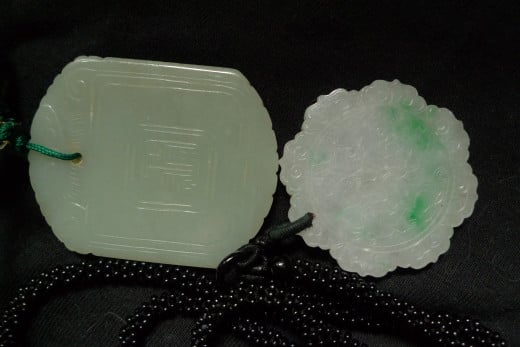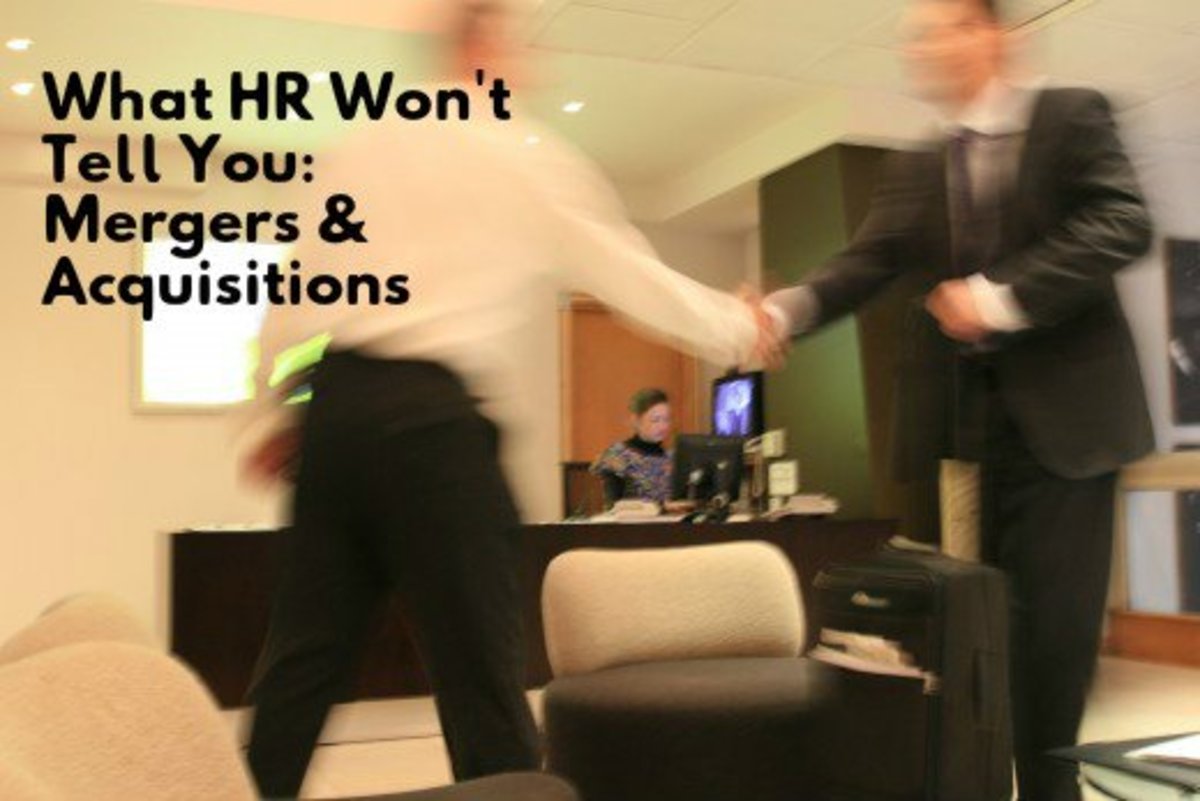THINKING ALOUD (Business&Law) Private Co-ownership Business - Valuation
Virtually every company will be going out and empowering their workers with a certain set of tools, and the big difference in how much VALUE is received from that will be how much the company steps back and really thinks through their business processes; thinking through how their business can change, how their project management, their customer feedback, their planning cycles can be quite different than they ever were before.
— Bill GatesNOTES TO READERS
The articles contained in this hub on Business Valuations are guides to hundreds of thousands of business entrepreneurs, particularly in Asia. They probably have little accounting-related knowledge but manage their firms based on experience and other technical skills.
These business people are not too concerned with the technicalities of valuation. As such, even common methods for small enterprises -- asset based and discount cash-flow methods -- are not included intentionally. Such information can be found in abundance on websites. Such technicalities are best left to the valuation experts to suggest what is best for particular business.
Nevertheless, business owners themselves are the best people to have in-depth knowledge of their industry. It is seldom possible to expect the auditor or the appointed valuation expert to have intimate knowledge of specialized trades. These experts can be found but they are likely to be working for big business conglomerates at highly lucrative fees.
The inputs from business owners will go a long way in helping valuation experts to include such intangibles which may form a great part of the market-value.
Chén Róng’s Little English-Chinese Dictionary
-
Rule of the thumb = cū cāo fang fǎ
- In the lurch = chǔ yú kùn jìng
- It's always wise to play safe;one cannot afford a single mishap = bú pà yí wàn jiù pà wàn yī
- Arm’s length = jiāo yì gè fāng shì dú lì hé píng děng
-
At each other’s throats = chǎo jià

HOW MUCH IS YOUR BUSINESS WORTH TO OTHERS?
Writer: Chén Róng
Valuation is an Art?
Next to this article, you see a photo image of two jade pendants. You might wonder if the writer is about to deviate from the topic of valuation of companies? No, he is not. Yes, he will start off with a discussion on the value of jade jewellery.
Besides colour, transparency, weight, and size, there are additional factors -- flaws, cracks, evenness and intensity of colour - that must go into the equation for determining the value of a piece of jade jewellery. This could be the method an appraiser may use for his valuation if asked to value the property for insurance purposes.
The writer and his wife often indulge in window-shopping for jade jewellery on their free-and-easy holidays in Hong Kong and China, although they often end up buying more jade-related books than jade pieces on many occasions. This is their common pursuit. There is an important finding worth noting. In a nouveau niche world, a brand's name has priority over price. More accurately, the trust placed in an established jeweller is a great value-enhancer. A piece of jade in the shop of a high-profile jeweller, let us just say CTF Jeweller , it can command a price thrice or more times than a similar piece placed in a relatively unknown suburb shop in a smaller city. Besides, prominent jeweller like CTF has loyal wealthy customers willing to pay seemingly inflated prices. They consider such purchases as value for money. When a socialite wears a piece of jade, she also wears a branded trophy of the rich and mighty. On this premise, value then is equivalent to price, regardless of what an appraiser may say. Valuing a piece of jade is therefore a subjective art.
What makes it difficult to put a valuation tag on CTF Jeweller - mainly assets of jadeite - is the lack of standard international pricing systems. Valuations on the gemstone are highly subjective and usually done by a select group of experts for jades best known for the green gem, but also come in different colours such as red, yellow, white and lavender. For that matter, valuation of CTF assets will also have to rely on auction house bids as their gauge. It is rare, if ever a hedge fund would set eyes on acquiring such a speculative business as it may not easily find ready buyers to take over.
Corporate Mergers & Acquisitions
To take the matter a little further; if you wish to acquire the business of CTF as appraised, its owner will most likely input highly subjective value-enhancing factors into the equation. This can price the business out of your reach. But it does not necessarily mean that CTF cannot command the high premium it asked for. There may be parties willing to consider inflated valuations, even of small enterprises as targets of mergers and acquisitions by multinational companies..
The writer is aware of the general perception that price is not necessarily a reflection of value. But judging from the many over-priced assets acquired round the world (and which had to be written down in value), it is not wrong to say that done-price is the market value of a business.
While hubris may be reason for a wealthy person paying a high premium for a piece of jade jewellery, opportunistic behaviour of top executives may be one reason for over valuating a target company for an acquisition. Because acquisitions increase the size of his business, they create a positive effect on a top executive's compensation and enhance his power. An acquisition also reduces his employment risk if he can extract synergy and value from the combined firm. Besides, some multinational companies are able to write-off notional losses -- a fall in the value of an acquired asset a business still holds -- to cut their corporate income tax. Such tax break rules (in jurisdictions such as Luxembourg) provide some justifications for top executives taking big gambles on mergers and acquisitions. At the moment, there are lots of companies with cash hoards or cash equivalents in hundreds of millions U.S. dollars and they want to put money to work and not just hoarding cash. The game of mergers and acquisitions will stay active for much longer. Smaller companies will remain the targets for M&A activities in Asia
Different Value for different occasion
Recently, public investors were offered a chance to own part of a company (real estate investment trust or REIT) and three independent professional valuers came forward with different sets of valuations on its major assets: S$522million, S$518million and S$293million respecitvely. A journalist-writer advised public investors to consider not only investment yields but also look closely at the difference in valuations, all within a period of eight months. The explanation given by the REIT was that the lowest of three valuations was made for financing and year-end financial reporting purposes. It was not intended for a sale transaction.
For the sake of discussion, just suppose a similar offer was made by a private company, would you buy the business with its major asset valuated at a seemingly lofty price? And the professional valuation was carried out for purpose of a sale transaction? Incidentally, the benchmark for measuring a property’s value is the price per square foot. This is a measure to compare different properties. It is also an indication of the returns an investor would earn from renting out the property.
READ OTHER STORIES AT:
chenrong.hubpages.com
Equity
| Debt
| CASH
|
|---|---|---|
The potential buyer of a business is interested in the owner's personal exposure---and the exposure of other stakeholders secondarily. The more the owner by invests personally, the more he or she has to make the business a success; hence an investor-buyer may mentally give the company a higher valuation. EQUITY is a part of an enterprise, and hence such an item is a part of the Enterprise Value.
| The company's ratio of debt to equity will influence a lender's willingness to lend. Equally, it will affect a potential buyer's off-the cuff valuation of the business's worth. In a world with taxes, a leveraged firm is more valuable than one without bank loans because of the tax advantage of debt.
| Cash has two components: (1) operating cash as working capital and (2) excess cash
|
Equity's attraction to a small enterprise is: It does not have to be paid back. Having too many small shareholders can be problematic. The writer suggests that the small enterprise strikes up a partnership with a large corporation through an equity by financing arrangement. It can be an attractive by option for a small business. The association with a larger company can increase a small business's credibility; helping it to obtain additional capital, and provide it with a source of expertise that might not otherwise be available. This partnership adds value to EQUITY which is a part of Enterprise Value.
| Moreover, the investor-buyer sees his by money being leveraged a lot more than dollars from the lenders. It is a perception that works to the advantage of a small enterprise. What percentage of debt that is generally acceptable in the world of investments may vary from industry to industry.
| Operating Cash Flow: The value of the firm can be derived by discounting expected cash flows (DCF) to the firm. It is the residual cash flow arrived at after meeting all operating expenses, reinvestment needs, and taxes, but prior to any payments to either debt or equity holders.
|
Likewise, investments in associates add value to EQUITY, hence a part of Enterprise Value.
| Firms sometimes have unused patents or licenses that do not produce any current cash flows and these may not produce cash flows in the near future, but are valuable nevertheless. If this is the case, the value obtained from discounting expected cash flows to the firm will understate the true value of the firm. These assets may be valued using other models other than DCF; and values can be added back to its Enterprise Value.
| |
,,,,,,,,
| -----------
| Excess Cash: A potential investor-buyer rewards firms that use excess cash well by mentally giving it a higher market value or Enterprise Value. The Excess Cash are generally kept aside for 'unexpected business' to be used in times of a liquidity crisis; or the firm may use the excess cash for expansion or diversification needs.
|
ENTERPRISE VALUE = Equity + Debt + Cash
PRIVATE CO-OWNERSHIP BUSINESS: Valuation
How much is your business worth to your heirs?
Writer: Chén Róng
Some Asian people I know are highly entrepreneurial. They have spent decades of their lives building their small businesses and yet if asked how much their enterprises are worth, probably no one can give you a rule of the thumb answer, not to mention an appraised value. Should the unthinkable event occur with their sudden death, it will leave heirs in the lurch; they are left abandoned in a conundrum to negotiate a buy-out price of the deceased’s shares. Unfortunately, negotiations will not be the win-win dialogue that all parties now badly needed.
This was the scenario played out with a business family I know. Three brothers were equal shareholders of a small business; and the company grew from strength to strength supplying hardware parts to oil-related companies in the Southeast Asia region. Two brothers were chain smokers and heavy drinkers partly serving a business need and more often engaged in self-indulgence. Sometime in the 1990s, two brothers died of smoking-related diseases, events that took place within a period of three years. Both brothers had no inkling of how much their business was worth, and during their last days they preferred to offer no advice to their sons. The heir of one applied a back-of-envelope calculation and asked for $1 million; and the other demanded a guesstimate figure of $5 million for selling his father’s shares. Both received their bequest. But what surprised everyone was the big contrast in price! What makes the difference more stark was the fact the one that got $1 million in paymentwas a time when the firm’s business was experiencing a boom period.
-
Rule-of-Thumb valuation method
Unlike public companies whose shares price is reflected every day on the exchange board, privately owned entities are much more difficult to value. There are probably more ways to value a private enterprise than the commonly used methods available; such as, dividend yield, net assets, and capitalization of earnings and discounted cash-flow. We will leave these valuation methods for discussion by the experts.
Besides using the services of professional valuers (if any), entrepreneurs should always have a personal valuation method to put a price on their small business; one premised on a rough and practical approach grounded on years of experience. These guesstimates of business worth should be communicated to their heirs-apparent who will, no doubt, greatly benefit from the sudden demise of the father-owner of the business. There are more ways than one approach to constructing such a rough mental guide for a business owner, so there is no need to adhere to the following method used for purpose of illustration.
Practitioners regard this rule-of- thumb estimates of value as one key ingredient to a technical exercise involving rather complex calculations.
-
Feedback is key to Valuation
No matter what valuation method is applied, a professional valuer will always give serious consideration to information provided by business owners. These dialogue pieces are part of his working ingredients when making assumptions about events that might affect earning potentials and, therefore, value of the business or shares in a company.
Where do business owners begin? What does he need to do when putting together the core information so required? One important thing that concerns a business owner is cash profit, i.e earnings above the cost of capital. This is where he/she should start for constructing a rule-of-thumb valuation. Next is to determine what discount rate he/she should use. To value the business, simply divide the cash profit by the discount rate to obtain the present value. Finally, add that number to the current book value of the capital and the result will be the rough valuation of the business.
- Book Value
Book value is the original capital invested by the business in various assets of plants and machinery to start the company after accounting for depreciation.
- Cash Profit
Cash profit is cash flow from business operations. It has its place in yearly financial statement of a company. In practical term, it is the net profit of the business after deducting all operating expenses, including interest costs, taxes and any periodical maintenance and upgrading works done to the business premises and equipment. However, all personal withdrawals by owners should not be included as expense items. Determining cash profit is, therefore, rather straightforward.
- Discount Rate
The next step involves the owner in deciding what discount rate to use in valuation. It is a highly subjective process. The greater the business risk, the higher will be the discount rate. Consequently, a smaller value will be assigned to it. An accountant will be able to assist the owner in determining the discount rate based on government bonds as the benchmark. A rule-of-thumb valuation can be derived at dividing the cash profit with the discount rate. One final step is to make adjustment to this resultant value with cash, liquid investment and debts incurred by the firm. Cash and investments add value to the balance sheet. Conversely, outstanding loans and debts diminish the value of the company.
- Knowing the business rules
Next is the firm’s ability to leverage on personal connections to grow its business; the unstated guidelines governing relationships - the trump cards for success - are known and executable only by the owners themselves. To re-visit our illustration on the family business of the three brothers:The firm provides components used in oil and gas drilling and production operations and oilfield services. National Oil Companies (NOCs) such as Malaysia’ Petronas and Indonesia’ Pertamina depended on the expertise of large international oil companies (IOCs) in USA and Western Europe. However, recently the NOCs have taken more control over their own resources and becoming more comfortable in developing their own fields. The owners (or brothers) should know the extent of their working connections with both the NOCs and IOCs in Malaysia and Indonesia; and the strategic alliances they have with overseas associates. It is imperative that they also know whether any change of business model of these industry players would significantly impair the health of their company in the medium to long term. These factors will influence the valuer’s judgement in conducting his valuation.
Knowing the rules – both formal and informal - of doing business in particular industry and country is critical. Regulations that guide taxes and levies on the business; constraints on imports or sales to Malaysia and Indonesia and the speed and extent at which these rules are enforced only insiders can tell. Like the recent haze that stems from illegal slash-and-burn forest fires in Indonesia, constant complaints of endemic official corruption will only infuriate good neighbourliness. The continued success of the three brothers demonstrated just how well they knew how to get around the rules and officialdom that matters. Insider information will ultimately have effects on assumptions made by the firm’s appointed valuers. Similarly, the business owner should have a mental calculation of such potential values which invariably make his share exit more valuable.
-
Subjective Valuation
There is probably no unique, absolute method that sits at the peak of every valuer’s appraisal scale. Thus when he mandates a choice of a particular valuation method and requires it to be painted over with assumptions or sort, values can shift up and down by 10-15 per cent on the scale. Hence, the relationship between an owner and his appointed appraisal has substantial influence on the outcome of a valuation. The monetary value can be huge if the business has churned up assets and goodwill in hundreds of millions.
One thing that may not have the minds of business owners is that the choice of valuer may have been determined from inception by the terms of the Articles of Association. The Articles of a private company may contain a clause authorising the appointment of the auditor for purpose of valuation when minority shareholders wish to sell their shares to other shareholders or the company itself. The exception to this rule is that if the parties have reached a buy-sell agreement between them. His appointment is that of an expert valuer rather than as an arbitrator. The Articles may also contain a provision empowering the auditor to value the shares on the assumption of arm’s length transaction between a willing seller and a willing buyer.
What should co-owners do under the circumstance?
-
A Buy-Sell Shareholder Agreement
It is in the interest of all owners of a business to have a Buy-Sell Shareholder Agreement in place to avoid the various problems faced with the sudden demise of one of them. A complicated issue may come into the equation when the deceased owner and his heirs have no inkling of how much his share of the business was worth. It is also prudent to have share values and other related matters in a document clearly spelled out to avoid unnecessary disputes. This agreement also overrides the provision in the Articles of Association appointing the auditor to also assume the role of a valuer.
The concept of a buy-sell agreement is simple: A binding contract that spells out exactly what is to be done if one of the business owners dies (or becomes disabled or retired). This document can be worded in simple or comprehensive terms as needed to provide for numerous contingencies. Basically, it calls for the surviving owners of the business to buy – and the heirs to sell – the deceased owner’s share in the company. Equally importantly is: it spells out the actual purchase price (not necessarily a smart way for a growing business) or, more equitably, providing an objective formula for determining the price when needed. Another fair approach is to name established professional valuers as independent parties to come out with a valuation which is legally binding on all parties. In this way, price haggling will be avoided.
Do not now put away this agreement and consider all work done. It is just work in progress. The owners should ask themselves the all-important question: Where does the company get the needed funds? In the case of the story on the three brothers, the surviving owner used his own private fund and bank borrowings to pay off the heirs of the brothers who suddenly died. This may be regarded as poor planning and an example never to be followed.
What the owners of the business need to have is an adequately funded buy-sell agreement for addressing all matters of transfer. It has to be kept up to date. It means current values and business structure; invariably the buy-sell agreement is not left untouched inside a drawer but to be reviewed and discussed at all times. This article cannot address all issues concerning continuation of the business – management’s ability to assume the reins – but one item needs highlighting and that is: adequacy of cash for the purpose.
There should be adequate cash reserves and adequate insurances held covered by the company to allow surviving shareholders to buy over shares of the deceased owner. There should also be a combination of corporate-owned insurances (cash value life insurances) and cash funding such as the creation of a sinking fund for the purpose. Otherwise, the buy-sell agreement is not worth the ink written on it, metaphorically speaking. It is high time co-owners of businesses start getting immediacy of underwriters and accountants.
There is this Chinese saying: It is always wise to play it safe; one cannot afford a single mishap. Unfortunately, not many in the Chinese business community are paying heed to this ancestral advice. Picture this scene. A co-owner suddenly died. His heirs and surviving shareholders are at each other’s throats. The absence of a buy-sell agreement is the source of conflict between shareholders. Adding to this acrimonious cauldron is a hapless auditor who has no choice but take on the task of valuing shares in the company; a duty borne out of a stipulation in the Article of Association. If his valuation is too low, he risks a legal claim for negligence brought by a disenchanted minority shareholder. His future appointment as auditor is at stake. Relationships between all parties continue to sour as the days past without a solution in sight. This situation is ugly. Co-owners of businesses should never mess with it.
READ OTHER STORIES AT:
http://chenrong.hubpages.com/hub/THINKING-ALOUD
---- E N D -----
Hubpages do not support words written in the Chinese Language. Readers can get a free online English-Chinese translation from GOOGLE TRANSLATE OR TRANSLATED.net
I have also included ChénRóng’s Little English-Chinese Dictionary for a more precise translation of select English phrases from the article.
……………….
UBER's valuation
Share-riding Uber was recently given a market value of US$69 billion !
Why the surprise? It is a relatively new company (formed 2009), and now Uber sits among US top ten corporations. But what is more incredible is Uber's huge financial loss incurred last year. It was a whooping US$2b. For the financial year ending Dec 2016, Uber will lose an estimated US$3b. Yet its valuation keeps getting higher, and now has a ranking above General Motors according to Bloomberg's Chart in June this year. But the current finance professor at New York University disagrees. This valuation expert says that Uber is only worth US$28b, and not what the market appraisers are valuing as between US$60b and US$69b.
My understanding is: a company’s market value is only indicative of investors’ perception of its business prospects. Indeed, Uber's net revenue - the amount Uber generates after paying its drivers - keeps rising quarter after quarter, as losses piles up into billions. This falls in line with Uber's bookings - the combined value of the fares that riders pay - keep increasing quarter after quarter. This explains investors' perception of Uber's business growth story. But the NY University finance professor has other ideas. In some places where Uber operates, there are often large discounts for riders and other special promotions. This is proof that the business model is not perfect. So, one can see that perception stays in a flux, and if more investors stand on the side of the finance professor, Uber's value may suddenly take a plunge.
Uber is a public-listed company, so it is not a good representation of a private company's market value! So, you argued. Nevertheless, you might have noticed the current trend of big business conglomerates buying up small firms in merger & acquisition deals. It is not too far-fetched a dream if a small firm gets bought-up because of a big investor's perception of its potential growth story. Timing is key. Fortunately, in a bull market, there are few investors like the NY University finance professor.
Dream on ! Many business owners have turned dreams into reality.
Computer-generated valuations
- writer's opinion -
The name is Streetsine. The valuation service runs on a digital platform named SRX Property. It is a digital property listing platform in Singapore.
This article is not about whether a tech-based property valuation is a better choice than the traditional ability of a licensed appraiser. A High Court case is on-going between the online valuation system and the long-established institution-based methods using valuation standards and practice guidelines. The institution's argument was: computer-generated valuations are not considered valuations under the rules of the professional body.
Whatever merits in the arguments, we will not discuss. One thing is certain - it will be a boon to small businesses. Online valuations are quick and simple. They offer a convenient access service through computers and mobile apps. One strong point is its low-cost.
Many people, especially small companies, want a quick evaluation to find out values of assets they own. Valuations may not need come with absolute accuracy to the real market values. There are many reasons for a valuation. Perhaps for purpose of sale, mortgage, insurance, joint venture or just fact-finding. Occasions may arise when a business wants a quick decision on acquiring a choice asset competing with others in a rising market and values (prices) keep changing rapidly. It is difficult to ask these business-savvy people not to use their gut-feelings and strong business judgment that are fundamental to many business decisions.
There are many seasoned business people out there who are making mental calculations and asset valuations based not on established standards but on purely commercial decisions. You may call it calculated business risk taking.
Read other stories: chenrong.hubpages.com
Disclaimer
The writer makes no warranty of any kind with respect to the subject matter included herein or the completeness or accuracy of this article which is merely an expression of his own opinion. The writer is not responsible for any actions (or lack thereof) taken as a result of relying on or in any way using information contained in this article and in no event shall be liable for any damages resulting from reliance on or use of this information. Without limiting the above the writer shall have no responsibility for any act or omission on his part. Readers should take specific advice from qualified professionals when dealing with specific situations.








